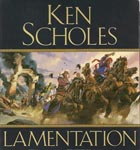

 Lamentation
Lamentation
By Ken Scholes; Read by Scott Brick, William Dufris, Maggi-Meg Reed, and Stefan Rudnicki
12 CDs – 15 Hours [UNABRIDGED]
Publisher: Macmillan Audio
Published: 2009
ISBN: 9781427206251
Themes: / Fantasy / Epic Fantasy / Religion / Politics /
A pillar of black smoke rises from the plains where the ruins of a city lie. Four people watch it. Petros, an old fisherman; Nebios, a boy who is the only eyewitness; Rudolfo, the Gypsy King and Lord of the Ninefold Forest; and Jin Lee Tam, consort of a powerful madman. Each takes up the story in turn and we learn as they do what has happened and what changes it bodes for the Named Lands.
Through their eyes, Ken Scholes masterfully unfolds layer upon layer of complexity to reveal an epic tale of the struggle not only for power but to serve the Light. This struggle between vengeance, knowledge, mercy, and justice is what drives the main characters. Scholes takes us into a world where Machiavellian politics are constantly intertwined between characters’ motivations. However, because he uses interesting characters to tell his story, it always feels personal and we realize the “epic” quality only as we look back over storyline development. As well, he skillfully manipulates these believable people (and, let us admit it, his readers as well) so that I literally went from worrying about one character being killed to hating him to coming back into sympathy and understanding again by the end of the book. In the end, what we see is that despite epic qualities, the question the book is asking is a simple one. Who was the evil mastermind that destroyed Windwir and why?
Scholes’ world is a mesh of societies that come from disparate sources but which blend seamlessly into an intriguing whole. Reminiscent of medieval times are the city-states and trading factions wielding great power. The people of the Ninefold Forests put one in mind of Robin Hood with their wood-wise ways that shun large, established cities. The Church has a pope and an Androfrancine order that seeks ceaselessly to acquire knowledge and store it for the common good. This too hearkens back to our historical past, yet there are also distinct elements informing us that this is instead a distant future after mankind’s knowledge was used to wreak a terrible calamity resulting in The Time of Laughing Madness. There is a distinctive steam-punk flavor to be found in the inventions that are discovered and released by the monks into general society.
This is a world in which long distance communication is done by messenger bird but where robots exist (mecho-servitors). As well as spoken, coded conversation, there is a fascinating finger tapping code used by those in the know. We also meet one of the mecho-servitors, Isaak, whose suffers from extreme guilt over possibly being used for the destruction and who seems to be developing a soul.
Finally, although we breathlessly follow the characters on their journeys, knowing that there are several books to follow in the series, Scholes does us the courtesy of tying up the story lines for all but a very few situations. This was extremely refreshing and much appreciated. Simultaneously, he opened a few intriguing threads of possibility that lead us to eagerly await the next novel. True to the mastery that we saw in the rest of the book, he does so with a few well written scenarios that leave the reader realizing that these are situations that were hinted at but essentially “hidden in plain sight” until the author decided to pull them into use.
Narration was brilliantly voiced by Stefan Rudnicki, Scott Brick, William Dufris, and Maggi-Meg Reed. All were perfect for their parts, with Brick doing the heavy lifting on any sections told from a point of view that came from other than the main four characters. What I found most interesting was the opportunity for comparison between how the four readers interpreted different characters. The book changes point of view between characters by stating the person’s name and then using what might be called over-the-shoulder story telling in third person from that point of view. Therefore, each of the narrators is called upon to do dialogue for various characters as they engage in conversation with the protagonist of the moment. Hearing how each interpreted Isaak’s robotic voice or Petros’s aged tones provided fascinating contrasts.
Highest recommendations go to this audio book and author Ken Scholes.
Posted by Julie D.
